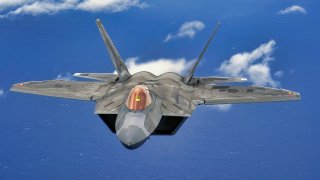F-22 Raptor vs. F-35: Who Would Win This Fighter Battle?
With overlapping roles and vague generational designations, discerning one jet from another can elude the less invested. Two particular jets, the F-22 and F-35, are occasionally lumped together as America’s only two “fifth-generation” fighters. However, the two most advanced fighters in America’s inventory are quite different from one another, serving various roles with different technological emphasis.
The line-up of American fighter jets can take time to keep straight. Let’s take a closer look at the F-22 and the F-35 relative to one another.
Air Superiority
Concerning air superiority, the F-22 is more capable than the F-35.
The F-22 should be more capable; it was designed exclusively as an air superiority fighter, and in that respect, the designers succeeded. Indeed, the F-22 is likely the premier air superiority fighter in the world. The F-22 achieves its premier air superiority status, in part, through its hyper-maneuverability, and in part through its integrated avionics and long-range weaponry.
The F-35 meanwhile is equipped to serve in an air superiority role, albeit not as superlatively as the F-22. The F-35 lacks the F-22’s maneuverability, despite also having thrust vectoring engines.
But the less powerful, one-engine F-35 doesn’t have the thrust-to-weight of the F-22. The twin-engine F-22 enjoys better maneuverability, speed, rate of climb, and service ceiling relative to the F-35, lending a distinct air superiority advantage.
Air to Ground
Comparing the F-22 and F-35 concerning air-to-ground capabilities is more straightforward since the F-22 wasn’t designed for ground-attack missions. Granted, the F-22 can perform a ground-attack function, and the internal weapons bay can accommodate two 1,000-pound GBU-32 JDAMs, but the natural inclination of the F-22 is pure air superiority.
The F-35 meanwhile was designed with versatility in mind, which includes a more robust air-to-ground capability. Renowned for the ability to integrate with other assets in the field, the F-35 features sensory equipment that can feed information to naval and ground units, and receive information in return, enhancing its situational awareness and ability to engage with ground targets.
Additionally, the F-35’s $400,000 helmet-mounted display (HMDS)\ feeds the pilot targeting information from the jet’s six infrared cameras, making target engagement all the more natural.
Cost to Operate
The F-22 is more expensive than the F-35, at about $350 million and $82-109 million respectively. In addition to costing so much to purchase, the F-22 is also extremely expensive to operate hourly; each hour of flying the F-22 costs about $85,000.
By comparison, an F-16 Fighting Falcon costs about $22,000 per hour. The F-35 meanwhile costs about $33,000 per hour to operate. So, the F-22 is a uniquely expensive piece of equipment – which is part of why the Air Force is exploring replacement options for the F-22.
The F-35 is also easier to update for future relevance, thanks to forward-thinking modular design features. The modular components of the F-35 include the avionics, the cockpit, and the HMDS helmet.
So, while the F-22 may be superior concerning air superiority, the F-35 is a much more versatile and affordable jet.
Harrison Kass is a defense and national security writer with over 1,000 total pieces on issues involving global affairs. An attorney, pilot, guitarist, and minor pro hockey player, Harrison joined the US Air Force as a Pilot Trainee but was medically discharged. Harrison holds a BA from Lake Forest College, a JD from the University of Oregon, and an MA from New York University. Harrison listens to Dokken.
Image Credit: Creative Commons and/or Shutterstock.

